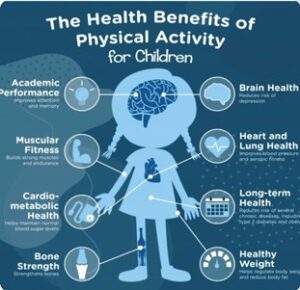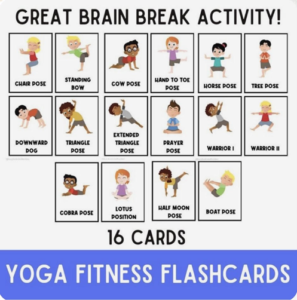Physical activities are essential for children’s overall growth and development, impacting their physical health, mental well-being, and social skills. Here are several key reasons why physical activities are crucial for kids:

- Promotes Physical Health: Engaging in regular physical activity strengthens a child’s muscles, bones, and cardiovascular system. It helps maintain a healthy weight, reduces the risk of childhood obesity, and prevents health issues like diabetes, high blood pressure, and cholesterol problems.
- Supports Motor Skills Development: Physical activities improve fine and gross motor skills, which are essential for daily tasks like writing, buttoning clothes, running, or jumping. Activities like sports, dancing, and playground play help children develop coordination, balance, agility, and strength.
- Boosts Cognitive Function: Exercise has been shown to improve concentration, memory, and problem-solving skills. Physical activities increase blood flow to the brain, stimulating neural growth and improving cognitive abilities, which can enhance academic performance.
- Enhances Emotional and Mental Well-being: Physical activity is a natural mood booster, releasing endorphins that reduce stress, anxiety, and depression. For children, regular activity helps regulate emotions and promotes better sleep, leading to improved mental health and emotional resilience.
- Improves Social Skills: Group sports and physical activities offer children opportunities to interact with peers, practice teamwork, and develop communication skills. Through play, children learn important social behaviors such as cooperation, patience, and leadership.
- Builds Confidence and Self-esteem: Mastering new physical skills, whether it’s learning to ride a bike or scoring a goal in soccer, gives children a sense of accomplishment. These successes build self-confidence and encourage a growth mindset, where they feel empowered to take on challenges and learn from setbacks.
- Instills Healthy Habits for Life: Introducing children to physical activities early in life sets the foundation for a healthy lifestyle. Children who are physically active are more likely to continue those habits into adulthood, reducing the risk of chronic diseases later in life.
- Teaches Discipline and Focus: Many physical activities, especially structured sports, teach children discipline, perseverance, and focus. They learn to set goals, practice regularly, and stay committed, which are important life skills beyond just physical fitness.
- Provides a Healthy Outlet for Energy: Children have a lot of energy, and physical activity provides a positive outlet for them to release it. Engaging in active play can help prevent behavioral issues, such as restlessness or hyperactivity, that can arise when children are sedentary for long periods.
- Strengthens Immune System: Physical activity boosts a child’s immune system by improving circulation, increasing oxygen flow, and enhancing the body’s ability to fight off infections and illnesses. Regular movement helps keep their immune system strong and resilient.
In conclusion, physical activities are a key component of healthy child development, contributing not only to their physical health but also to their emotional, cognitive, and social well-being.
Check out the below printable flashcards for Yogo Fitness to practice at home.

